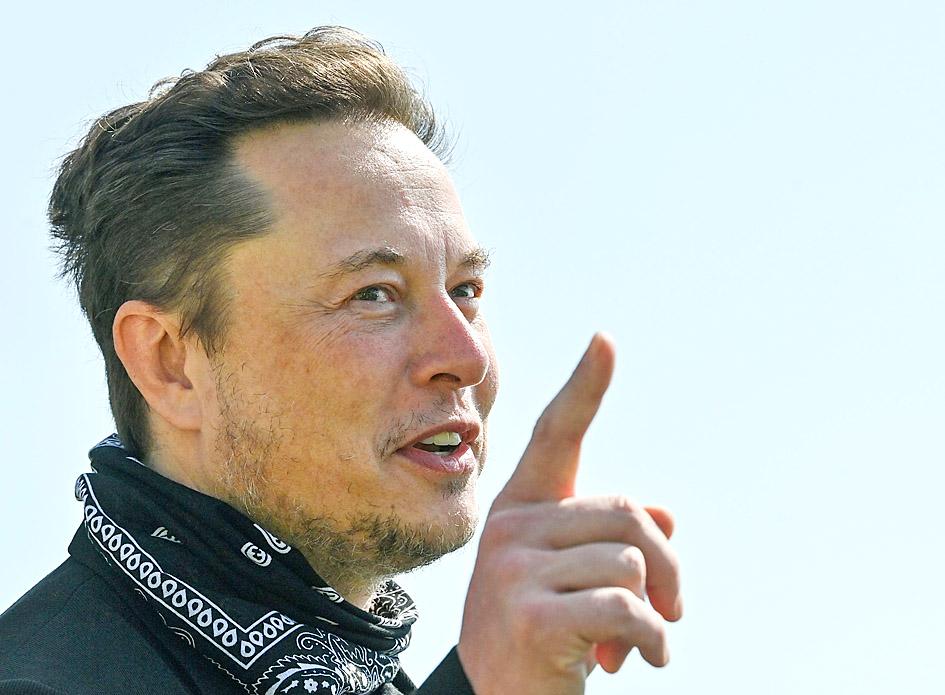Tesla Inc chief executive officer Elon Musk thinks US regulators should take cryptocurrency out of their crosshairs, leaving it free to “fly,” he told a conference in Beverly Hills, California, on Tuesday.
The colorful serial entrepreneur, an outspoken digital money fan, shared his view at the Code Conference as governments around the world fret over cryptocurrency threatening their control of financial systems.
Asked by interviewer Kara Swisher what US regulators should do about cryptocurrency, Musk said: “I would say, do nothing.”

Photo: Reuters
“I would actually say, just let it fly,” he added.
US Securities and Exchange Commission Chairman Gary Gensler said earlier at the conference that there is potential for cryptocurrency to be considered a security, and platforms to be seen through the lens of those regulations.
Last week, the White House nominated Saule Omarova to lead the US Office of the Comptroller of the Currency (OCC), all but confirming that US financial regulators would be void of any crypto allies for at least the next three years.
The Cornell University law professor’s critiques of digital tokens fit right in with statements that have recently emerged from government watchdogs.
Also last week, China’s central bank said all financial transactions involving cryptocurrencies are illegal, sounding the death knell for the digital trade in the country after a crackdown on the volatile currencies.
“It is not possible to destroy crypto, but it is possible for governments to slow down its advancement,” Musk said during the on-stage interview.
The global values of cryptocurrencies, including bitcoin, have fluctuated massively over the past year, in part due to Chinese regulations, which have sought to prevent speculation and money laundering.
“It would appear they don’t love cryptocurrency; it’s subtle, but hinting in that direction,” Musk said, referring to the crackdown in China.
“I suppose cryptocurrency is fundamentally aimed at reducing the power of a centralized government, and they don’t like that,” he added.
Part of China’s concern could also be over electricity shortage problems, as mining cryptocurrency uses massive amounts of power, Musk said.
While the outlook for crypto has changed markedly since the end of former US president Donald Trump’s administration, the reversal has been particularly sharp at the OCC, which regulates national banks including JPMorgan Chase & Co and Citigroup Inc.
Under former acting US comptroller of the currency Brian Brooks, who stepped down in January, the OCC had granted limited bank charters to cryptocurrency firms — raising concerns among traditional Wall Street players that they might soon face a new slate of competitors.
Yet Acting US Comptroller of the Currency Michael Hsu pulled up the welcome mat.
If Omarova is confirmed by the US Senate, the OCC would likely go even further in pursuing stricter oversight of digital tokens and tougher rules.
Additional reporting by Bloomberg

With an approval rating of just two percent, Peruvian President Dina Boluarte might be the world’s most unpopular leader, according to pollsters. Protests greeted her rise to power 29 months ago, and have marked her entire term — joined by assorted scandals, investigations, controversies and a surge in gang violence. The 63-year-old is the target of a dozen probes, including for her alleged failure to declare gifts of luxury jewels and watches, a scandal inevitably dubbed “Rolexgate.” She is also under the microscope for a two-week undeclared absence for nose surgery — which she insists was medical, not cosmetic — and is

CAUTIOUS RECOVERY: While the manufacturing sector returned to growth amid the US-China trade truce, firms remain wary as uncertainty clouds the outlook, the CIER said The local manufacturing sector returned to expansion last month, as the official purchasing managers’ index (PMI) rose 2.1 points to 51.0, driven by a temporary easing in US-China trade tensions, the Chung-Hua Institution for Economic Research (CIER, 中華經濟研究院) said yesterday. The PMI gauges the health of the manufacturing industry, with readings above 50 indicating expansion and those below 50 signaling contraction. “Firms are not as pessimistic as they were in April, but they remain far from optimistic,” CIER president Lien Hsien-ming (連賢明) said at a news conference. The full impact of US tariff decisions is unlikely to become clear until later this month

GROWING CONCERN: Some senior Trump administration officials opposed the UAE expansion over fears that another TSMC project could jeopardize its US investment Taiwan Semiconductor Manufacturing Co (TSMC, 台積電) is evaluating building an advanced production facility in the United Arab Emirates (UAE) and has discussed the possibility with officials in US President Donald Trump’s administration, people familiar with the matter said, in a potentially major bet on the Middle East that would only come to fruition with Washington’s approval. The company has had multiple meetings in the past few months with US Special Envoy to the Middle East Steve Witkoff and officials from MGX, an influential investment vehicle overseen by the UAE president’s brother, the people said. The conversations are a continuation of talks that

CHIP DUTIES: TSMC said it voiced its concerns to Washington about tariffs, telling the US commerce department that it wants ‘fair treatment’ to protect its competitiveness Taiwan Semiconductor Manufacturing Co (TSMC, 台積電) yesterday reiterated robust business prospects for this year as strong artificial intelligence (AI) chip demand from Nvidia Corp and other customers would absorb the impacts of US tariffs. “The impact of tariffs would be indirect, as the custom tax is the importers’ responsibility, not the exporters,” TSMC chairman and chief executive officer C.C. Wei (魏哲家) said at the chipmaker’s annual shareholders’ meeting in Hsinchu City. TSMC’s business could be affected if people become reluctant to buy electronics due to inflated prices, Wei said. In addition, the chipmaker has voiced its concern to the US Department of Commerce